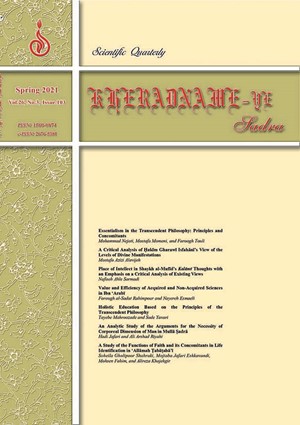-
-
List of Articles
-
Open Access Article
1 - Editor's Note
Seyyed Mohammad Khamenei -
Open Access Article
2 - Essentialism in the Transcendent Philosophy: Principles and Concomitants
Mohammad Nejati Mostafa Momeni Faroogh Touli -
Open Access Article
3 - A Critical Analysis of Ḥakīm Gharawī Isfahānī’s View of the Levels of Divine Manifestations
Mostafa Azizi Alavijeh -
Open Access Article
4 - Place of Intellect in Shaykh al-Mufīd’s Kalāmī Thoughts with an Emphasis on a Critical Analysis of Existing Views
Nafiseh Ahl Sarmadi -
Open Access Article
5 - Value and Efficiency of Acquired and Non-Acquired Sciences in Ibn ‘Arabī
Forough al-Sadat Rahimpour Nayereh Esmaeli -
Open Access Article
6 - Holistic Education Based on the Principles of the Transcendent Philosophy
Sude Yavari Tayebe Mahroozade Ali Sattari -
Open Access Article
7 - An Analytic Study of the Arguments for the Necessity of Corporeal Dimension of Man in Mullā Ṣadrā
Hadi Jafary Ali Arshad Riahi -
Open Access Article
8 - A Study of the Functions of Faith and its Concomitants in Life Identification in ‘Allāmah Ṭabāṭabā’ī
Soheila Golipoor Shrakey Mojtaba Jafari Eskavandi Mohsen Fahim Alireza Khajegir
-
The rights to this website are owned by the Raimag Press Management System.
Copyright © 2017-2026







